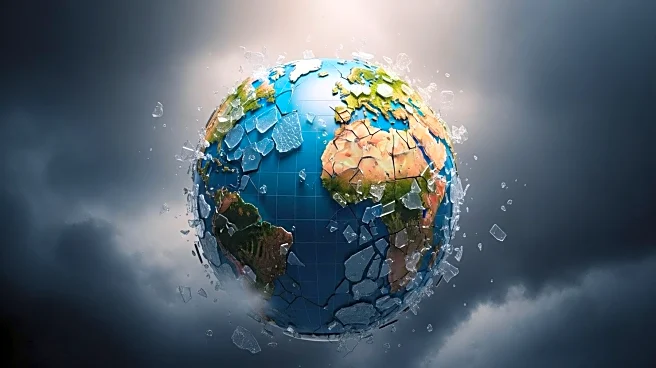What is the story about?
What's Happening?
The United Nations-backed negotiations aimed at finalizing a global agreement to end plastic pollution have collapsed for the second time. The talks revealed a significant divide between nations with high ambitions for reducing plastic production and those with petrochemical manufacturing interests. The failure to reach an agreement underscores the challenges in addressing the global plastic waste crisis, as highlighted by Earth Action For Impact's 'Plastic Overshoot Day'. This day marks the point in the year when humanity's plastic waste exceeds the global capacity to manage it, with 225 million tonnes of plastic waste expected to be produced this year. NGOs are advocating for process reforms in future negotiations, suggesting that a simple majority vote or more frequent meetings could lead to a stronger treaty.
Why It's Important?
The collapse of the UN negotiations on a global plastics treaty is significant as it impacts both environmental and business sectors. Without a binding agreement, plastic pollution continues to pose risks, leading to increased state regulation and litigation against companies. The financial implications are substantial, with potential litigation costs in the U.S. alone projected to reach $20 billion by 2030. Companies that proactively measure and reduce plastic risks can build resilience, while those that delay may face mounting liabilities. The divide between nations highlights the complexity of balancing environmental goals with economic interests, particularly in countries with significant petrochemical industries.
What's Next?
Future rounds of negotiations may see calls for procedural changes, such as adopting a simple majority vote to facilitate agreement. NGOs are pushing for more regular meetings to maintain momentum in the talks. Meanwhile, businesses are likely to face increasing pressure to address plastic pollution through regulatory measures and potential litigation. The ongoing impact of plastic waste on the environment and business underscores the urgency for a global solution, despite the current stalemate in negotiations.
Beyond the Headlines
The failure to reach a global plastics treaty has deeper implications, including ethical and cultural dimensions. The divide between nations reflects differing priorities and values regarding environmental stewardship and economic growth. The lack of a treaty also raises questions about global governance and the ability of international bodies to address complex, cross-border issues. Long-term shifts may include increased innovation in waste management technologies and a cultural shift towards sustainable consumption patterns.

















